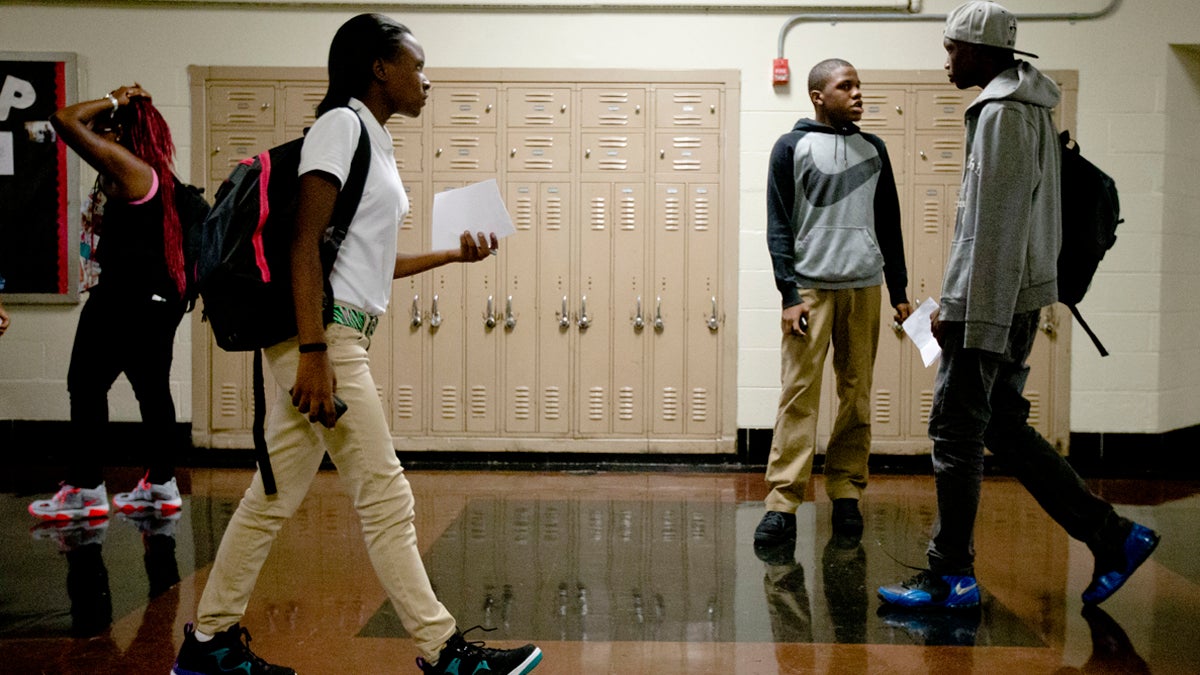Meatless Mondays in school lunches can help Philly save the environment

Students check in as they arrive at a new high school called The LINC, which stands for Learning in New Contexts in Philadelphia. (AP Photo/Matt Rourke)
Mayor Michael Nutter’s visions of a greener Philadelphia have have done wonders for the city, from increasing tree coverage to lowering energy use and diverting waste from landfills. But Philly has no hope of becoming the most eco-friendly city in America unless we take a look at what we eat.
Four years ago, Mayor Michael Nutter promised to make Philadelphia the country’s greenest city. Last year he reported that 95 percent of his planned sustainability initiatives were underway or complete. His visions have done wonders for the city, from increasing tree coverage to lowering energy use and diverting waste from landfills.
But something is missing. The home of the Philly Cheesesteak has no hope of becoming the most eco-friendly city in America unless we take a look at what we eat.
A choice for Philadelphia
According to a senior scientist at the United Nations, “livestock are one of the most significant contributors to today’s most serious environmental problems.” Not only are they responsible for 18 percent of the world’s greenhouse gas emissions, but they also contribute to land degradation and water and air pollution.
That’s one reason the Philadelphia City Council unanimously passed a resolution in October urging residents to participate in Meatless Monday, stating that “a plant-based diet has been demonstrated to use fewer resources and cause less pollution than a meat-based diet.”
Now, the School District of Philadelphia has the opportunity to make the sustainable choice to implement Meatless Monday. The concept is simple, and easy to accomplish — serve meat-free meals just one day a week — but the results would be staggering. The district provides about 110,000 lunches a week, which means Meatless Monday would serve 22,000 meat-free meals — every week.
Effects on pollution, health and sustainability
Decreasing meat consumption is the only way to make its production more sustainable. While planting trees and installing solar panels are steps in the right direction, the USDA reports Americans are still eating 57 pounds more meat annually than they did in the 1950s. The industry has responded by making larger, more concentrated farms.
In Lancaster County alone, more than 3.7 million egg-laying hens produce as much manure as sewage from the Columbus, Ohio, metropolitan area, according to Food and Water Watch. Unlike human sewage, which undergoes a thorough treatment process, livestock waste is often left untreated and sprayed on fields or stored in large, open lagoons. This waste then pollutes groundwater or runs off into local streams and canals, and releases dangerous amounts of ammonia and nitrous oxide into the air.
Nitrous oxide has almost 300 times the global warming potential as carbon dioxide, and the United Nations estimates that livestock production is responsible for 65 percent of all nitrous oxide released into the air from human activities.
Going meat-free just one day a week will decrease overall demand and help prevent further devastation. The Clean Air Council, Johns Hopkins School of Public Health, and Sodexo are just a few of the countless organizations now promoting Meatless Monday as an effort to maintain health and sustainability nationwide. A growing number of districts across the country, including Los Angeles Unified School District, Detroit Public Schools, and San Diego Unified School District, already participate in the program.
Kids will eat it
Not only are plant-based meals better for the environment, but a study in the Florida Health Review showed students’ willingness to purchase them. When offered vegan menu options alongside popular entrees such as pepperoni pizza and chicken nuggets at two separate schools, a majority of students at both schools chose the vegan option. The same study found that the vegan option — which included veggie burgers, vegetable chili, and rice and beans — were just as easy to prepare as traditional dishes, according to kitchen staff.
In addition, vegan foods contain all the nutrients necessary for a healthy diet and are less expensive than animal foods. The School District of Philadelphia has nothing to lose by implementing Meatless Monday in its cafeterias.
Residents can support the campaign by urging the district to join cities around the country in implementing Meatless Monday by signing the petition.
—
Rachel Atcheson is the Philadelphia Director of The Humane League.
WHYY is your source for fact-based, in-depth journalism and information. As a nonprofit organization, we rely on financial support from readers like you. Please give today.

